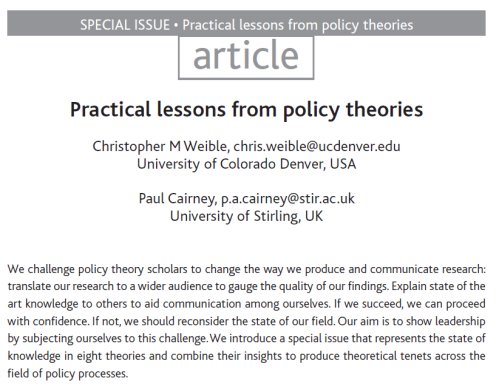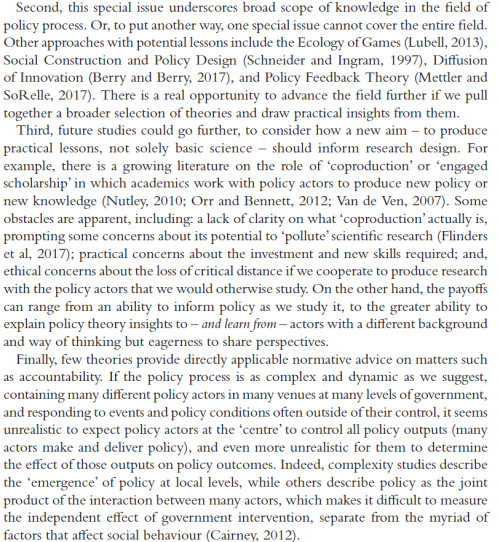These links to blog posts (the underlined headings) and tweets (with links to their full article) describe a new special issue of Policy and Politics, published in April 2018 and free to access until the end of May.

Three habits of successful policy entrepreneurs
Telling stories that shape public policy
How to design ‘maps’ for policymakers relying on their ‘internal compass’
Three ways to encourage policy learning
How can governments better collaborate to address complex problems?
How do we get governments to make better decisions?
How to navigate complex policy designs
Why advocacy coalitions matter and how to think about them
None of these abstract theories provide a ‘blueprint’ for action (they were designed primarily to examine the policy process scientifically). Instead, they offer one simple insight: you’ll save a lot of energy if you engage with the policy process that exists, not the one you want to see.
Then, they describe variations on the same themes, including:
- There are profound limits to the power of individual policymakers: they can only process so much information, have to ignore almost all issues, and therefore tend to share policymaking with many other actors.
- You can increase your chances of success if you work with that insight: identify the right policymakers, the ‘venues’ in which they operate, and the ‘rules of the game’ in each venue; build networks and form coalitions to engage in those venues; shape agendas by framing problems and telling good stories, design politically feasible solutions, and learn how to exploit ‘windows of opportunity’ for their selection.
Background to the special issue
Chris Weible and I asked a group of policy theory experts to describe the ‘state of the art’ in their field and the practical lessons that they offer.
Our next presentation was at the ECPR in Oslo:
The final articles in this series are now complete, but our introduction discusses the potential for more useful contributions









Dear Paul,
It sound like a very relevant seminar for my work (education policy implementation at OECD) and my research. I recently completed my phd thesis on education policy focusing on school leadership reforms applying a public policy lense (can send you the exec summary or short ppt).
Would you be able to send the right link to the seminar? It doesnt seem to work.
Congratulations on your research, which i follow with much interest.
Best wishes, Beatriz Pont
Sent from my iPhone
>
Pingback: Writing for Impact: what you need to know, and 5 ways to know it | Paul Cairney: Politics & Public Policy
Pingback: Practical Lessons from Policy Theories: a new agenda | Policy and Politics Journal
Pingback: Three habits of successful policy entrepreneurs | Paul Cairney: Politics & Public Policy
Pingback: How do we get governments to make better decisions? | Paul Cairney: Politics & Public Policy
Pingback: Why Advocacy Coalitions Matter and How to Think about Them | Paul Cairney: Politics & Public Policy
Pingback: How can governments better collaborate to address complex problems? | Paul Cairney: Politics & Public Policy
Pingback: Telling Stories that Shape Public Policy | Paul Cairney: Politics & Public Policy
Pingback: How to Navigate Complex Policy Designs | Paul Cairney: Politics & Public Policy
Pingback: Evidence based policymaking: 7 key themes | Paul Cairney: Politics & Public Policy
Pingback: Three ways to encourage policy learning | Paul Cairney: Politics & Public Policy
Pingback: How to design ‘maps’ for policymakers relying on their ‘internal compass’ | Paul Cairney: Politics & Public Policy
Pingback: What is a policy entrepreneur? | Paul Cairney: Politics & Public Policy
Pingback: #EU4Facts: 3 take-home points from the JRC annual conference | Paul Cairney: Politics & Public Policy
Pingback: How to write theory-driven policy analysis | Paul Cairney: Politics & Public Policy
Pingback: Why don’t policymakers listen to your evidence? | Paul Cairney: Politics & Public Policy
Reblogged this on Paul Cairney: Politics & Public Policy.
Pingback: Three habits of successful policy entrepreneurs | Policy and Politics Journal
Pingback: Narratives as tools for influencing policy change | Policy and Politics Journal
Pingback: Policy & Politics Highlights: our Winter collection | Policy and Politics Journal